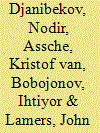| Srl | Item |
| 1 |
ID:
113319


|
|
|
|
|
| Publication |
2012.
|
| Summary/Abstract |
In this article we investigate the potential for and limitations of land consolidation as a tool for rural development in transitional environments, focusing on the Khorezm region in Uzbekistan, Central Asia. We frame our analysis in a broader evaluation of land consolidation as a tool for economic development based on European experiences. It is argued that both the European tradition and the Uzbek case indicate that land consolidation as an isolated measure may trigger many unfavourable side-effects, and that in a transitional environment it requires even more careful tailoring of measures and embedding in various institutional settings.
|
|
|
|
|
|
|
|
|
|
|
|
|
|
|
|
| 2 |
ID:
156102


|
|
|
|
|
| Summary/Abstract |
What would a ‘good’ industrial policy in the realm of cotton production look like? This article seeks to address this question through a focus on reforms to the cotton sector in Kazakhstan. In contrast with neighbouring Uzbekistan and Turkmenistan, administrators in Kazakhstan had widely freed the cotton sector from government control as early as 1998. Agricultural collectives had been replaced by small private farms, and commercial cotton processors and traders entered the sector. However, in 2007, regulation tightened again and forced ginneries to use a complex warehouse receipt system without making sure that it was accepted by stakeholders and without appropriate institutions for implementing it in place. Moreover, it imposed financing restrictions on ginneries, which were major loan and input providers to farmers. In the following years, private producers and investors turned away from cotton, and cotton area and output fell substantially. We position our analysis in the broader debate about the right approach to industrial policy and argue that the cotton sector performance after 2007 shows how ill-designed regulation and government interference can turn a promising economic sector towards decline.
|
|
|
|
|
|
|
|
|
|
|
|
|
|
|
|